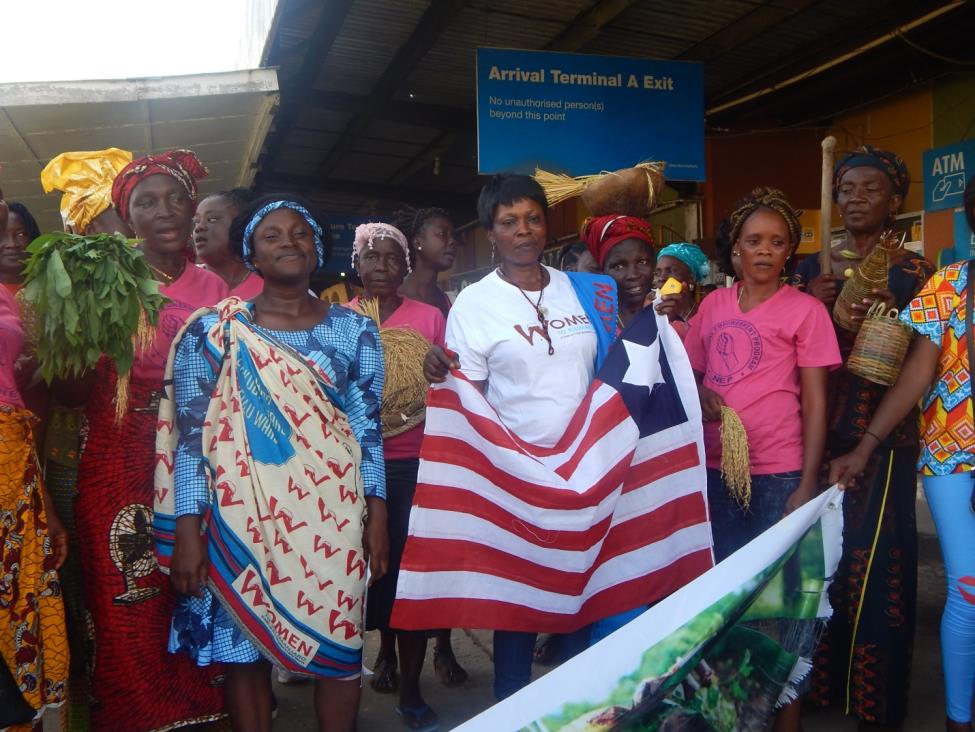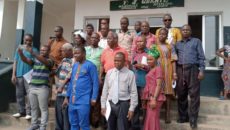UNIFICATION CITY, Margibi – The two representatives to the Kilimanjaro Initiative in Tanzania have returned to a rousing welcome by the Rural Women of Liberia at the Roberts International Airport on Monday.
The Minister of Gender, Children, and Social Protection, Julia Duncan Cassell, and representatives from ActionAid Liberia participated in the ceremony.
The delegates were Jesadeh Barzon, President of Rural Women in Grand Gedeh and Marie Clarke, Assistant Secretary for the Rural Women in Gbapolu. They represented rural women in Liberia at an assembly of women from countries across Africa.
The Kilimanjaro Initiative is an idea that was conceived by rural women and supported by civil society organizations in 2012 to claim African women’s rights to access and control over land and natural resources

Minister of Gender, Children and Social Protection, Julia Duncan Cassell (middle) with some women. Photo: Gbatemah Senah
ActionAid, one of the organizations supporting the women’s initiative, said the common adhesive for the Kilimanjaro Initiative is the desire to end the ubiquitous and continued violation of women’s rights to land.
It said the initiative is fanned by the laxity in implementing key international, continental and country level policies and frameworks that would protect and guarantee women’s land tenure rights.
Land issues for women in Africa remain complex partly due to dualism in the land tenure system, the existence of poor land policies, and governance systems that entrench gender inequality. Women have weaker land rights compared to men.
According to the organization, in some countries, land policies have been designed, promulgated and even launched without any genuine concern for the human resources and other logistical requirements necessary to carry out the wide-ranging reforms that are proposed.
Whereas the African continent boasts of progressive policies and legal frameworks that seek to enhance women’s rights to land, implementation has too often been weak or even nonexistent, according to ActionAid. In some cases, they report existing laws and implementation mechanisms have been swept away by new policies without regard for managing the transition itself.

Jesadeh G. Barzon, President of Rural Women, Grand Gedeh, and delegate to Kilimanjaro Initiative. Photo: Gbatemah Senah
Barzon said she was proud to represent rural women in Liberia by sharing her experiences at the event and listening to the stories from women in other countries in Africa.
She said to address the challenges surrounding women’s access to land rights, the women developed and proclaimed a charter of demands that will be presented to the African Union and their respective national governments.
In addition, the charter will pressure African countries to do more in giving women access to land ownership and protection. Some of the issues to be tackled by the charter include land and investment, inheritance, and early marriage.

Scores of women at RIA to welcome Liberia two representatives to Kilimanjaro Initiative. Photo: Gbatemah Senah
As a means of making governments accountable and to implement their demands, she said the women have also threatened to climb to the peak of the Kilimanjaro Mountain as a sign of protest against the governments’ action.
“As African women, we have agreed to unite and work in solidarity,†Barzon said.
Thirty-two women climbed the peak of Mount Kilimanjaro. Marie Clark, the other delegate from Liberia, was a proud recipient of a certificate for being among those who successfully made it to the peak of the mountain.
Terming her success as a victory for women in Africa, Clark said reaching the peak was a challenge.
“We agreed to voluntarily sign a commitment to bear all the risks involved,†she said. “The first day was a four-hour walk, the second day we went behind the clouds. It was not easy; very miserable. The third day, we went to the base camp, a place they call Kipo. While in Kipo, it was not easy. We were all out of oxygen, but yet we said we would not turn back.â€
Clark said they persevered and finally arrived at the peak, before coming down. According to her, the distance to the peak was 36 kilometers. “We are so proud to fight for the women of Africa,†she added.

Marie Clark’s certificate acknowledging that she reached the peak of Kilimanjaro. Photo: Gbatemah Senah
ActionAid Liberia Program Manager, Damawa Biah, said her organization was excited to receive the women back home after working with them from the beginning and planning preparation stages for their travel.
Biah said her organization believes in the doctrine of equality and praised the women for their bravery.
She also said rural women in Liberia are major users of farmland and increasing access and protection for land rights would be a milestone for their livelihood and development.
“If women are tilling the land, they need to be masters of that land,†Biah said. “So, if you take away their land in the name of companies coming to operate, women wouldn’t have land to even fetch firewood.â€
Other organizations supporting the women’s Kilimanjaro Initiative includes the Tanzania Gender Networking Program, the International Land Coalition, and Oxfam.
Featured photo by Gbatemah Senah


